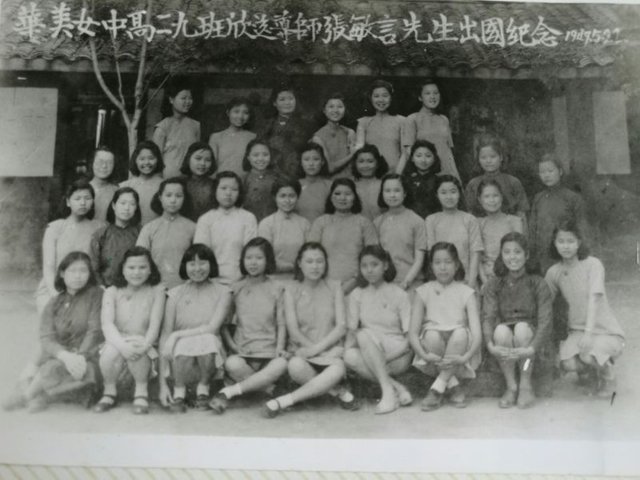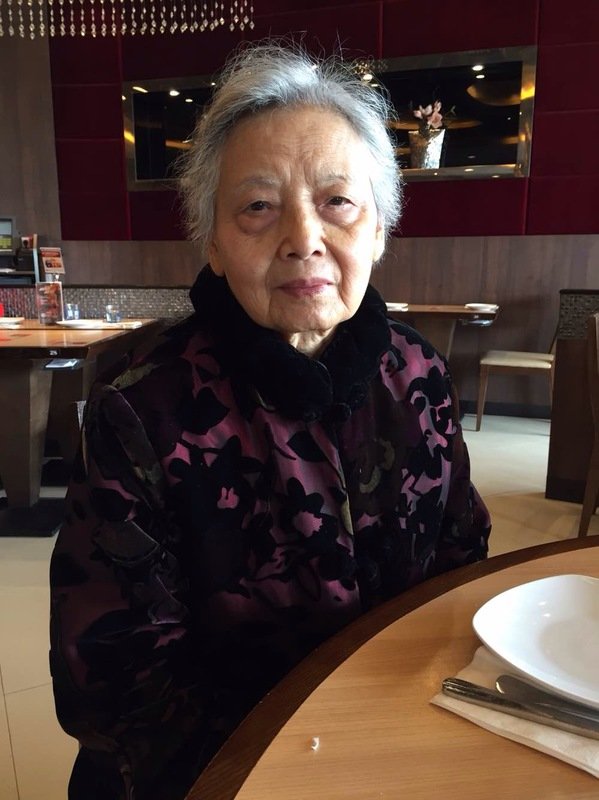Memoirs From Communist China - Why My Mother Was Denied Party Membership and Experiences of Food Shortages During the Great Leap Forward
My mother is an incredible story teller. Many family friends frequently invite themselves over for dinner just to hear her old stories from China. She was an American Literature major in graduate school, but hasn't written for ages. Upon hearing about Steemit, she had the idea of writing down her stories and sharing them with all of you. After the success of her first story about her name, she has been full of excitement and joy with the new prospects of story telling on Steemit. She plans on writing short stories such as the one below, sharing them all exclusivley on Steemit, and eventually combining all of the stories into a memoir book. I hope you enjoy the following words from my mom!
This story was written by my mother, Xiaoing Cai

Unlike my father who joined the Communist party in the early 1950s, my mother was denied the Communist party membership each time she applied. Part of the reason for the denial was because of the “Land Lord” class status of her family. The other reason was because she had the air of a petty bourgeois who dressed herself with style and decorated her home with nice furniture and even a vase with fake flowers. The demonstration of her individuality made her unpopular in her work unit. In my mother’s own words, she “did not have a good relationship with the masses (群众关系不好)”.

Right after graduating from college in 1952, my mother was assigned a job by the government to work for Sichuan Bureau of Irrigation in Chengdu where she met my father. They fell in love and got married in 1954. Two years later my oldest sister Xiao Feng was born. My parents adored their first born daughter and showered her with much love and attention. My maternal grandmother moved in to help take care of the baby. When my older sister was one, my mother was pregnant again. Both my parents wanted their second child to be a boy and they waited with great anticipation. In November of 1958, Xiao Ling was born. Both my parents were disappointed that they did not have a son. My father did not show much comfort nor support to my mother. One of their major fights happened the day when my mother was discharged from the hospital and my father took her home. My father was pushing a bicycle carrying the parcel of my mother’s personal items while my mother was walking behind him carrying the baby in her arms. At one point my father told my mother to catch up with an impatient tone in his voice. My mother was saddened and shocked by my father’s inconsiderate request and she cried, yelled, and let out her anger toward my father once they arrived home.

Eight months after Xiao Ling was born, my mother’s work unit “Chengdu Geologic Survey Bureau” needed to send four young staff members to do physical work on a geologic survey project for a year in the mountainous area of Sichuan, about 100 miles away from our home. This was a program to reform young government workers through hard physical work. Coming from a landlord family background, my mother was an easy target. She was chosen despite the fact that she just had a baby eight months before and she had another toddler at home. Being a government worker, my mother could not say “no” to the boss who assigned her this job although her heart was filled with anguish and resentment. At that time, my father was working for the Agricultural Land Management Bureau in Chengdu but he was away working in the countryside and my mother could not reach him. Feeling desperate and helpless, my mother sent her eight month old baby to her older sister in Chongqing to be cared for. She then put my other sister into a full time boarding kindergarten. My aunt at that time had three little children of her own. But being a responsible older sister, my aunt did not say “no” to my mother although my aunt’s family, like all people in China at that time, suffered from starvation. From 1958 to 1961 the Chinese government launched a social and economic campaign called “The Great Leap Forward” led by Mao Ze Dong. The goal of “The Great Leap Forward” was for China to achieve rapid transformation from an agricultural society to an industrial and socialist society through rapid industrialization and collectivization. Private farming was banned and People’s Communes were set up all over China. “The Great Leap Forward” led to great famine and the deaths of tens of millions. My sister Xiao Ling was with my aunt’s family for a year. My mother received a telegram from her sister one day requesting that Xiao Ling needed to go back to my mother because my grandmother was dying. My grandmother was a devout Buddhist and vegetarian. In 1960 she died of a lung disease caused by malnutrition and starvation at the age of sixty.

My father, being a cadre working for the Irrigation Bureau, was always sent to the rural areas of Sichuan to check on the progress of the People’s Communes. On one of his trip to the countryside, during “The Great Leap Forward” period, my father went with a younger government worker. They shared a room in the hostel. At lunch time, the directors from the People’s Commune treated my father and his colleague to a dozen steamed buns (馒头), trying to show their hospitality to cadres from the provincial government. This was such a luxury for my father and his colleague since they had been starving. My father’s younger colleague ate as much as he could and as fast as he could. That night he got extremely sick. My father rushed him to the hospital but he died of an exploded stomach.

At the same time that Xiao Ling was sent back to Chengdu, my mother also completed her challenging physical work in the mountain. She refused to return to her original work unit because she resented her boss who she thought was unkind to keep her away from her two young children for a year when he could have easily picked someone else. Her new boss at the geologic survey project agreed to re-assign her dossier so she could be assigned a job at the Agricultural Land Management Bureau where my father worked. To her biggest disappointment, my father, who was in management position, disagreed and suggested that my mother should work at the East Wind Canal Management Bureau, a lower level work unit located at the northern suburb of Chengdu, far away from our home. My father’s reason was that couples should not work in the same work unit in order to avoid conflict of interest. He was only concerned about his career and showed no consideration to his own family. As a Communist party member, any gesture of denying personal or family needs was expected and complete devotion to the Party was encouraged. As a result, my mother was once again separated from her children because her work unit was so far that she had to live in the work dormitory. She was only able to return home on weekends. My mother worked at that unit for almost twenty years. My father’s interference with my mother’s work assignment was the core source of my parents’ numerous quarrels in the years to come.

After my sister Xiao Ling was sent back to Chengdu, she was admitted into the same kindergarten as my oldest sister Xiao Feng. My parents were only able to pick up the girls on Saturday afternoon and spend a Sunday together. My sisters would go back to the boarding kindergarten on Sunday evening. Xiao Ling was always a very sullen and quiet toddler. She did not really know my parents and was not close to them at all. Each time when my father went to pick up my sisters on Saturday afternoon, Xiao Feng would run to my father with open arms and excitement and Xiao Ling would either hide behind the door or run the other way. My father would run after her and spank her bottom after catching her to show his displeasure. My sister Xiao Ling had a troublesome relationship with my parents as a child, which developed into a vicious circle. She did not feel loved by my parents and became rebellious and stubborn. My parents, especially my mother, often punished Xiao Ling by spanking her.

When my older sister Xiao Feng was six years old, my mother felt a lump under Xiao Feng’s arm. My parents took Xiao Feng to the hospital and she was diagnosed with lymphoma. Xiao Feng received surgery and radiation treatment but the doctors told my parents that Xiao Feng only had six years to live. This news was like thunder in a bright sunny day and my parents lived in fear for years that one day they were going to lose their beloved first daughter. My sister’s cancer diagnosis brought my parents closer together and this was when I was conceived. Fortunately the prediction of my sister’s untimely death was incorrect. Other than a very skinny right arm caused by the radiation, Xiao Feng is a happy and healthy mother and grandmother today.

This is a FABULOUS idea! I consider myself to be kind of my family's documentarian by archiving everything I can - photos, letters, newspaper clippings, etc. Her plan here would be quite the heirloom to have. I'm going to read your whole post and probably reply again shortly. ;-)
Wonderful post. Thank you. The hardships of others are often overlooked, and the troubles your parents had are certainly nothing I would wish on any family. It's very brave of her to want to share these stories, and I will be following you to read more as you post it. :)
I can't wait to read your posts. So rich in emotion and history. And the pictures let you visualize as you are reading. Your mother is as beautiful now as she was back then. You can just see the strength and character in her face.
content like this should get more attention and upvote from other member
i love this article, how your mom want to share about their journey
love for your mom :)
I echo @happyphoenix's sentiments. Great insight to the great troubles in 'Great Leap Forward'... and @janqoin's comment. It gives me a better understanding of what it's like to live under a communist regime.
Your mom is a great storyteller. I find it amazing people can remember their lives so vividly. My memories are just a vague haze...
Thanks for the story. Chinese people are great but the communist regime is evil. The communist party can't be trusted. Here is a 5 minute documentary video of great leap forward:
Why did the pirate go to the Caribbean? -He wanted some arr and arr.
I grew up in communist totalitarian country and I now very well how hard is to explain life in such regime to people from the west. This story is just a hint of how different reality on the same planet we can experience... well done and say hello to your mother! :-)
Long years and health to Xiao Feng
Dear User known as @anwenbaumeister
Steemit has a BOT problem! Your Vote Counts... Maybe
https://steemit.com/steemit/@weenis/bots-steemit-s-first-community-based-decision-on-bots-your-vote-counts-to-be-or-not-to-be-details-inside
I always love your mother's stories about china and her family back in those times. "The Great Leap Forward" was a significant period in modern history of China and i am sure living through those times must be very difficult. Awesome on how your mother passed down stories from your grandparents. Looking forward to more posts :-)